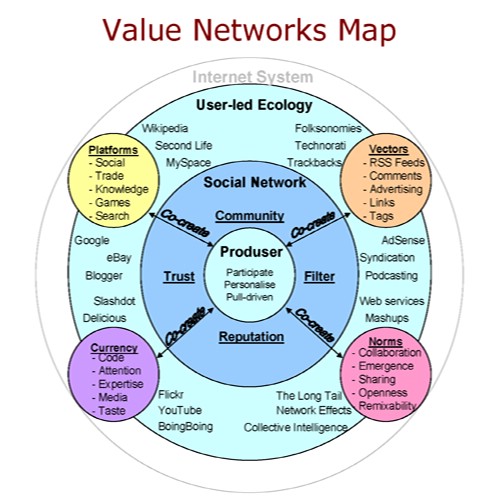Over the past few years, I've created a few neologisms - terms such as 'gatewatching', 'newssharing', and of course 'produser' and 'produsage'. While some might frown on this (hi, Jean), in my view it's absolutely necessary for researchers to abandon traditional terminology when it becomes overly limiting, and obscures important new features of their objects of study. So, for example, the traditional journalistic process of gatekeeping is giving way to a new mode of gatewatching in news production; for journalists and other news commentators this is "a shift from the watchdog to the 'guidedog'" role, as Jo Bardoel and Mark Deuze have put it.
Similarly, I believe very strongly that at least in an informational context, the idea of content production with all of its industrial-age connotations is no longer useful. In the informational age, production, distribution, and consumption are no longer distinct stages of the process; instead, we need to find new terms which better describe what's really going on. While some use workarounds like pro-am production or commons-based peer production, my suggestion is the idea of produsage, as a hybrid form of 'productive usage' which does away with strictly defined roles of producer, distributor, and consumer and instead introduces a produser who is at different times more or less directly and intensely involved in a collaborative, distributed process of content creation.
My task for the coming year - an early new year's resolution, if you like - is to define and describe this produser and the produsage process they're involved in, and in doing so to demonstrate the validity and applicability of this model. The central outcome for this is going to be my next book, [weblink:475] (or whatever title we finally settle on), but there will be a good number of other publications along the way, too. But beyond my own publications, the ultimate measure of success for these ideas is the extent to which they're picked up by other researchers - that is, the reach which these memes can achieve beyond my own work.
So, I've been interested to see that some of these terms have now made it into the vocabulary of some of my esteemed colleagues - for example, futurist, VRML inventor, and occasional New Inventors panellist Mark Pesce now includes 'produser' as a tag category on his blog (and his 'hyperpeople' may well be produsers in their own right). Jo Jacobs picks up the idea in a lead article for the wonderfully titled e-journal The Knowledge Tree, and Smart Internet researcher Darren Sharp has used the term in a number of presentations, papers, and the "Digital Lifestyles Monitor" report - and his keynote at the recent Smart Services Forum also included this useful graphic:

Additionally, machinima researchers and activists seem to have picked up on produsage - RMIT's Leo Berkeley uses the term in a paper for the Australian Journal of Emerging Technologies and Society, and the organisers of the 2006 Machinima Film Festival also refer to it. Further, I've already mentioned the uptake of the term at the recent ATOM2006 conference, which included references to the term by everyone from AFTRS lecturer Ben Goldsmith to Urban Cinefile editor Andrew Urban... Of course, finding mentions of the term 'produser' is somewhat complicated by the rampant misspellings of 'producer' on many Webpages, as well as by the fact that the Indonesian word for 'producer' is in fact 'produser'!
On the gatewatching front, there's some good movement as well. My German colleague Christoph Neuberger described the idea of gatewatching to the renowned German technology site heise online (leading to some characteristically robust Slashdot-style discussion), and across the border in the Netherlands, Mathijs van den Broek discusses the idea in De Nieuwe Reporter (as far as my very rudimentary Dutch allows me to understand), with a few other mentions in related articles. Even further afield, Alex Primo and Marcelo Träsel use the term in what looks like an interesting paper from Brazil (in Portuguese with an English abstract).
I'm also happy to see a few more reviews of my book [weblink:28] coming through: the Canadian Journal of Communication has published a nice and generally positive review by Kate Milberry of my book [weblink:29]; there's another interesting review by Sue Robinson (looking at Gatewatching alongside a number of other new journalism books) in New Media & Society; and then there's also this review by Eva Kol - and Google lists some 20,000 links for 'gatewatching' now...












